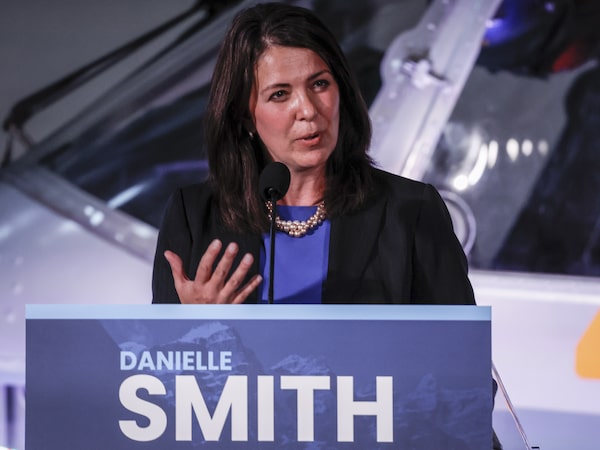
Danielle Smith makes a comment during the United Conservative Party of Alberta leadership candidates' debate in Medicine Hat, Alta., on July 27.Jeff McIntosh/The Canadian Press
Jen Gerson is a contributing columnist for The Globe and Mail.
The drizzle and cloud did little to spoil the glory of a warm fall last Thursday in Carseland, Alta., a hamlet located just outside Calgary with a population of 542. At the local community centre, seven people gathered to drop off their UCP leadership ballots and listen to the woman most likely to become premier of Alberta later this week.
As has become her habit with these small crowds, Danielle Smith eschewed the lectern, sat in a chair, grabbed a notepad and asked the attendees to talk about their concerns.
“Freedom,” said one man in a baseball cap. “To do what Alberta has always stood for.” Ms. Smith nodded.
“I lose sleep worrying about the future for my kid,” another attendee said. “I don’t like the direction the world is going.”
“And how are your kids?” Ms. Smith asked. Not good, the attendee said: Her daughter was forced to be vaccinated to go to university. Another said they were unable to see one of their kids in Tennessee in part because of the federal vaccine mandates. Online schooling was a “complete gong show.” Another child is suffering anxiety.
It’s hard to see the scene as a political rally so much as a group-therapy session. And it speaks to how Ms. Smith, a former political exile, has been able to redeem herself.
The bulk of the coverage focusing on Ms. Smith has picked apart her signature policy promise: a “Sovereignty Act” that promises to privilege provincial jurisdiction in Alberta, rather than federal laws. The act deserves the ample criticism it has received. But there is one aspect to that proposed act that strikes home: It will, she says, “push back against Ottawa with any new vaccine mandates.”
In short, the passion juicing Ms. Smith’s campaign isn’t closet secessionism: It’s backlash to the government restrictions of the COVID-19 pandemic, and to the near-unison of voices that called for ever stricter ones to curb the spread of the disease – voices that sometimes called those who disagreed murderers, deplorables, or worse.
Take, for example, Rebecca Reaville, a bus driver and mother of three from Airdrie, Alta. She said she had never voted in a leadership race before, but drove 70 kilometres from her home to Strathmore to drop off a ballot for Ms. Smith at her rally there, which followed the one in Carseland. It was COVID-19 – specifically, the “insults” she heard from Prime Minister Justin Trudeau – that, she said, persuaded her to become politically active.
“He created division between his own people over vaccination. That shoved me over to one side of a spectrum. My family now hates me, thank you,” she said, adding that she was unvaccinated. “My dad was convinced I was going to kill my children.”
“Why we’re having this leadership race centres on the harm that was caused by lockdowns,” Ms. Smith told her supporters in Strathmore.
Yes, Ms. Smith’s stump speech included a litany of long-standing Alberta grievances, Ottawa’s meddling chief among them. But it was her insistence on “vaccine choice,” and her promise to change human-rights law to prevent future lockdowns, that garnered the most applause.
One year ago, beset by aggressive protesters and struggling to revive a flailing election campaign, Mr. Trudeau made a choice: to channel the vaccinated majority’s frustration with people who seemed to be holding up our collective return to normal.
“The folks out there shouting, the anti-vaxxers, they are wrong,” Mr. Trudeau said at one campaign stop in Sudbury. “They are putting at risk their own kids, and they’re putting at risk our kids as well.”
He turned vaccines and mandates into a wedge issue – even if it deepened political polarization. And it worked; Mr. Trudeau won a slim minority mandate.
Those vaccines weren’t the silver bullet, though. Canada’s high vaccination rate almost certainly helped reduce the spread of COVID-19, and prevented an untold number of severe cases. But months after Mr. Trudeau took his stand against the unvaccinated, the Omicron variant swept the country, jumping between the vaccinated and non-vaccinated alike (though not at the same rates).
In the end, vaccine passports lasted only a few months in most provinces, and the federal government dropped travel mandates on Oct. 1.
Of course, it’s ironic that Ms. Smith’s political ascension, and that of federal Conservative Leader Pierre Poilievre, comes just as the federal government seems ready to retire its most restrictive COVID-19 measures. But the alienation caused by those measures, and Mr. Trudeau’s rhetoric, remains among some Canadians. We saw proof of that during the trucker convoy, even though indoor limits were planned to end not long after.
Now that frustration has a name and a face in Alberta. And she’s likely to become premier.